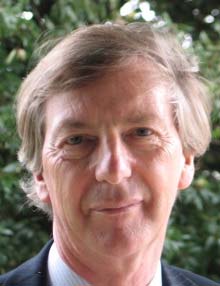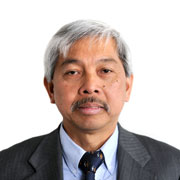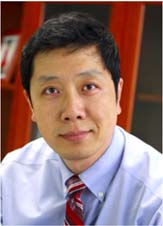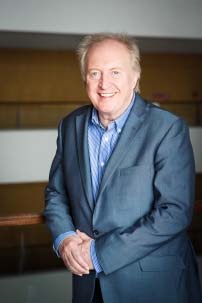 | Mr François Rancy, Director of the ITU Radiocommunication Bureau Mr François Rancy was elected Director of the ITU Radiocommunication Bureau by the
ITU Plenipotentiary Conference 2010 (PP-10) in Guadalajara, Mexico. He took office on 1 January 2011. He was confirmed in a second term by the
ITU Plenipotentiary Conference 2014 (PP-14) in Busan, Republic of Korea.
François Rancy is an engineer, a graduate of the École Polytechnique (1977) and the École Nationale Supérieure des Télécommunications (Paris, 1979).
From 1979 to 1997, he worked as systems engineer and subsequently Head of Department in France Télécom's research laboratories, where he was in charge of studies on national and international satellite systems and activities relating to the spectrum and the regulation of satellite systems. As from 1992, his responsibilities expanded to cover the entire radiocommunication sphere.
From 1997 to 2004, he was Director of Spectrum Planning and International Affairs at the National Frequency Agency (ANFR).
From 2004 to 2010, he was Director-General of ANFR, responsible for frequency management in France.
In October 2010, he was elected Director, BR by the ITU Plenipotentiary Conference.
At the international level, he led the coordination of European delegations (CEPT) at WRC-03 and chaired the European Union group on spectrum management policy (RSPG) in 2007. He chaired the ITU–R Special Committee on Regulatory and Procedural Matters from 1997 to 2003, and the World Radiocommunication Conference in 2007.
François Rancy has been awarded the ITU Silver Medal (2007) and the titles of Chevalier de la Légion d'honneur (1998) and Ordre national du mérite (1992). |

| Christoph Dosch, Chairman, ITU-R Study Group 6Christoph Dosch graduated from the Technical University Munich in telecommunications engineering in 1976 and then joined the Institut für Rundfunktechnik GmbH (IRT),
www.irt.de, as scientific engineer, working first on terrestrial television and then on satellite broadcasting systems in the 12‑GHz and 20‑GHz band. Having become Head of the Broadcast/Satellite System Section in 1982, he was appointed Deputy Head of the Department "Broadcasting Coverage and Transmitter Engineering" in 1992. From 1996 he served IRT as General Manager "Collaborative Research ", being responsible for IRT's collaborative research projects. After his retirement in March 2014, he continued working for IRT as liaison officer to ITU. Since 1977, C. Dosch was involved in ITU's World Radiocommunication Conferences. He chaired the Working Party 6S (Satellite Broadcasting) before he was elected Chairman of ITU-R Study Group 6 in 2007, see
http://1f8a81b9b0707b63-19211.webchannel-proxy.scarabresearch.com/en/ITU-R/study-groups/rsg6/Pages/default.aspx. |
Session 1 | Objectives of the transition to digital TV– technical and regulatory frameworks |
 | Phil Laven, Chairman DVB Steering BoardPhilip Laven has been Chairman of DVB since 2008. Between 1997 and 2007, he was Technical Director of
the European Broadcasting Union based in Geneva. Before joining the EBU, he worked for the BBC in
various senior posts including Chief Engineer R&D and Controller of Engineering Policy, thus playing a
leading role in the development of the BBC's policy on many technical developments, such as the
introduction of digital audio broadcasting and digital television. |
 | Pham Nhu Hai, Counsellor of ITU-R Study Group 6Mr Hai is Counsellor of ITU-R Study Group 6 on broadcasting issues. Until 2014, He headed the Broadcasting Services Division, Radiocommunication Bureau of the ITU in Switzerland responsible for the regulation and planning of broadcasting spectrum around the world. Mr Hai led the International Telecommunication Union (ITU) joint effort with regional radio and telecommunication organisations, in assisting countries around the world in their transition to digital television and harmonisation of the digital dividend spectrum.
Mr Hai led the Planning Exercise Team (PXT) of the Regional Radiocommunication Conferences RRC04/06 that established the GE06 Agreement setting the framework for introduction of digital radio and television in 120 countries in Europe, Africa, Middle East and part of Asia.
Originally from Vietnam; Graduated from University of Adelaide, Australia; Mr Hai has worked all over the world, in the fields of spectrum management, radiocommunication regulatory and policy development, in both private and national and international public sectors. |
No photo | Ilham Ghazi, ITUMs Ghazi is with the BR-ITU in charge of the GE06 Agreement, and all relating issues to Terrestrial
Broadcasting, including the Transition to the Digital broadcasting and Digital Dividends issues.
She is charged by the ITU to lead and organize the regional coordination meetings on the GE06 to enable
frequency coordination meetings to enable administrations to have additional frequencies in in the Band
470-694 MHz and facilitate the release of the DD1 and/or DD2: Africa: achieved in July 2013 and Arab
countries: ASMG: achieved on April 2015. |
 | Istvan Bozsoki, ITUMr Istvan Bozsoki joined the ITU in 1997 to work at the Space Department of the Radiocommunication
Bureau and he was dealing with coordination and notification of satellite systems. In 2007 he moved to the
Telecommunication Development Bureau and is responsible for spectrum management and broadcasting
issues. Since April 2013 he is Head of Spectrum Management and Broadcasting Division.
After obtaining his degree in telecommunication engineering at the Technical University Budapest in 1980
he spent 17 years at the Hungarian Communication Authority and he was dealing with technical and
regulatory aspects of the spectrum management. Among others, he was responsible for the development of
a computerized spectrum management system. Later, he was appointed as director of international affairs.
He has a master degree in radiocommunications and broadcasting. |
Session 2 | The analogue to digital switchover – stocktaking worldwide |
 | Roger Bunch, Free TV AustraliaRoger Bunch is Director of Engineering at Free TV Australia. Free TV is an industry body which represents
all of Australia's commercial free-to-air television licensees. Roger has been Chair of the Standards
Australia committee responsible for the Australian terrestrial television transmission standard, AS4599,
since 2003. As a member of delegations from Australia Roger has been involved in ITU-R activities since
1999 with the Australian submission of revised parameters for Recommendation ITU-R BT.709 Parameter
values for the HDTV standards for production and international programme exchange. Roger has
participated in several ITU-R Study Groups on spectrum related matters since 2002.As a member of
delegations from Australia Roger has been a participant in the Asia pacific Telecommunity Preparatory
processes for WRC’s since 2002.Since WRC-03 Roger has been involved in studies associated with WRC
Agenda Items most notably as Rapporteur for WRC-07 Agenda Item 1.11 “protection of terrestrial
services and, in particular, the terrestrial television broadcasting service in the 620-790 MHz band from
GSO and non-GSO BSS networks” and WRC-12 Agenda Item 1.5 “worldwide/regional harmonization of
spectrum for electronic news gathering (ENG)”. Roger is a Vice Chair of ITU-R Study Group 6 and ITU-R
Working Party 6A. Roger is a Fellow of the Society of Motion Picture and Television Engineers. |
 | Jian Song, Tsinghua University (Vice-chair WP 6A)Professor Jian Song received his PhD degrees from Electronic Engineering Department, Tsinghua
University, China in 1995. He then conducted Postdoctoral research work in The Chinese University of
Hong Kong and University of Waterloo, Canada in 1996 and 1997, respectively. Dr. Song has been
working with Hughes Network Systems in USA for seven years before joining the faculty team in Tsinghua
as a full professor in 2005 . He is now the Director of DTV Technology R&D Center which is one of the
major technical contributors to the Chinese DTMB standard. Prof. Song is very active with ITU and is the
vice-chair of WP6A. |
No photo | Nisar Ahmed Khan, Doordarshan |
 | Reiko KONDO, Ph.D., Ministry of Internal Affairs and Communications, JapanReiko KONDO, Director for Digital Broadcasting Technology, Broadcasting Technology Division,
Ministry of Internal Affairs and Communications. Dr. Kondo graduated from the Graduate School of the
University of Tokyo and got Master’s degree in Computer Science. She also got MBA at Stanford Graduate
School of Business and Ph.D. at Tokyo Institute of Technology. Since Dr. Kondo joined the Ministry of
Internal Affairs and Communications, she has contributed to the policy development in information and
communications technology and held such positions as Deputy Director of the Broadcasting Technology
Division, in charge of developing the overall channel plan for digital TV broadcasting in Japan and also
drafting the strategy for next-generation broadcasting technology, and Deputy Director of the Policy
Planning Division of the Minister’s Secretariat. She also held a position in National Institute of Information
and Communications Technology as Director of Policy Planning Office of the Network Security Research
Institute and in National Information Security Center of the Cabinet Secretariat as Counsellor for
International Strategy from 2011 to 2014. |
No photo | Bassil Zoubi, ASBU |
 | Leo Boruett, Communications Authority of KenyaEng. Leo K. Boruett is currently working with Communications Authority of Kenya (CA) as a Director
responsible for Multimedia Services that includes broadcasting. Eng. Boruett is also one of the Vice
Chairmen of ITU-R Study Group 1. Eng. Boruett has been working in the communications sector in Kenya
for the last twenty four years. During his career, he has contributed to the development of technical and
regulatory aspects in Kenya in the areas of telecommunications, broadcasting and frequency spectrum
management. His latest major contribution was the coordination of regulatory and operational aspects
with respect to the digital migration process in Kenya. Eng. Boruett has a Bachelors degree in Electrical
and Electronics Engineering, MPhil degree in Information Engineering (Computer Speech and Language
Processing), and a Masters Degree in Business Administration (Executive). He is also a Registered
Professional Engineer in Kenya. |
No photo | Abayomi Olaiya Bolarinwa, CEO, Yomi Broadcast Services LimitedIn 1994, Mr. Bolarinwa joined the National Broadcasting Commission, as an Assistant Director and rose to
become the Director of technology in 2005. In 2007 he was appointed acting Director General of the
Commission and later substantive Director General. A foundation member of the Nigerian Frequency
Management council, 2006 to 2013, Bolarinwa led the Nigerian delegation to the Radio Regional
Conference 2006 (RRC06). He has been a vice chairman of the ITU study group 6 since 2007. Bolarinwa
retired from Government service in May 2013 and is currently CEO of Yomi Broadcast Services Limited. |
No photo | Amadou Top (Mahmoud BAAL), CONTAN |

| Andrew KisakaAndrew Johnson Kisaka holds a Master degree of Information Communication Technology (ICT) offered by Coventry University of United Kingdom in collaboration with Kigali Institute of Technology. He is also having a Post graduate diploma of Electronics and Information technology from University of Dar e salaam (UDSM).
He has been working in broadcasting sector for over two decades and started his career with Public Broadcaster (Radio Tanzania) from 1983 – 1999. In 1999 he Joined Tanzania Communications Commission (TCC) as a Senior Frequency Management Engineer and in 2003 worked with Tanzania Communications Regulatory Authority (TCRA) after the merge of Tanzania Broadcasting Commission (TBC) and Tanzania Communication Commission.
From 2008 – 2010 Engineer Andrew Johnson Kisaka worked with Rwanda Utility Regulatory Authorities (RURA) as an expert and Consultant in spectrum management and the Director of ICT.
Mr Kisaka is a coordinator of the National Technical Committee for digital migration in Tanzania and currently Principal Broadcast Engineer in TCRA. He is as well chairman of African Spectrum Working Group (AfriSWoG) and Registered as Professional Engineer by Engineer Registration Board of Tanzania. |
 | Bernard Pauchon, TDF, Chair of DigiTAG Spectrum&Networks GroupBernard Pauchon was the founder and first Chairman of Broadcast Networks Europe (BNE), the European
terrestrial broadcast networks operators association, where he used to represent TDF. He is now directly
working for BNE in the position of Special Advisor, whilst keeping working for TDF, in particular for the
representation at the Steering Boards of the DVB consortium and of DigiTAG, the association promoting
DTT which embraces all stakeholders of the DTT value chain where he chairs the Spectrum and Networks
Working Group. Bernard Pauchon is also a member of the IBC International Council. |
No photo | Thiago Aguiar SOAREZ, ANATELMr. Soares holds a degree in electrical engineering from University of Brasilia (UnB) and works as
coordinator on broadcasting planning and technical regulation in the National Telecommunications
Agency (Anatel), Brazil. |
No photo | Guno Cooman, CBU / ATV-Telesur, SurinameGuno Cooman, born 29-04 57 in Paramaribo ,Suriname. He has been working as a journalist and TV and
radio producer since 1976. He also holds a bachelor in Economics (BEc). Currently he serves as Manager of
ATV/Telesur and member (director) of the board of the Caribbean Broadcasting union. |
No photo | Larry Olson, FCC |
Session 3 | Advanced technologies for television |
 | Paul Gardiner, SonyPaul Gardiner is Standards Manager at Sony Broadcast & Professional Research Labs within Sony Europe
Ltd, based in Basingstoke, UK. He studied Electronic Engineering at the University of Southampton before
joining the Independent Broadcasting Authority (IBA) in 1974. His career has included television technical
regulation and R&D project management with responsibility for various international collaborative
research projects. Since joining Sony in 2007, he has been an active participant in the SMPTE standards
community and has continued to serve as a UK delegate to the ITU R where he has been closely involved
in the activities of Working Party 6C, particularly those related to video. Paul is Co-Chair of SMPTE
Technology Committee 10E (Essence) and is a SMPTE Fellow. |

| Christophe Chabanne, DolbyChristophe Chabanne graduated from the University of Miami’s Audio Engineering program. He joined Dolby Laboratories in 2001 and focused most of his career on surround sound related technologies such as multichannel audio, binaural rendering, matrix encoding/decoding, and psychoacoustics. In recent years, as part of the core leadership team for next generation audio in Cinema, he co-led the conception, development, and commercialization of Dolby Atmos. Since the launch of Atmos in Cinema, he has been focusing on Atmos for consumer applications as part of Dolby’s CTO Office. |
 | Yukihiro Nishida, NHK (Chair WP 6B)Yukihiro Nishida is Chairman of Working Party 6B and Vice-Chairman of Study Group 6. ITU-R
Recommendations and a Report on Integrated Broadcast-Broadband (IBB) systems have been developed
under his chairmanship. He is one of the principal contributors to the development and standardization of
ultra high definition television (UHDTV). He is the Head of Standardization at NHK, Japan. |
Session 4 | Building a sustainable ecosystem for digital TV |
 | Simon FellSimon Fell is Director of Technology & Innovation for the EBU, a position he took up in September 2013. He
has more than 35 years’ experience in senior broadcasting technology roles, including at British broadcaster
ITV, where he was Director of Future Technologies (2008-2009) and Controller of Emerging Technologies
(2004-2006). From 1991 to 2004 Mr Fell worked for Carlton Television, the ITV franchise holder for the
London region, where he held several executive roles linked to operations and emerging technologies. Mr
Fell, prior to joining the EBU, was Chairman of the Technical Council at the Digital Television Group, the
industry association for digital television in the UK. He also represented UK broadcasters on the EBU
Technical Committee between 2006 and 2009. |
No photo | Peter Mac Avock, EBU |
 | Mark S. Richer, President ATSCMark S. Richer is the President of the Advanced Television Systems Committee, Inc. (ATSC). The ATSC is an
international, non-profit organization developing voluntary standards for digital television.
Mr. Richer first joined the ATSC after 16 years with the Public Broadcasting Service (PBS) where, as Vice
President of Engineering & Computer Services, he was responsible for development of new technologies for
PBS and its member stations and management of information technology operations.
Before assuming his current role as President of the ATSC, Mr. Richer served as Vice President & General
Manager, CDS, a division of Thomcast Communications. He was also responsible for marketing,
communications, strategic planning and business development for Thomcast Communications, including its
Comark and Comwave subsidiaries.
Mr. Richer served as Chairman of the System Subcommittee Working Party on Test and Evaluation for the
FCC Advisory Committee on Advanced Television Service.
Mr. Richer was the 2010 recipient of the National Association of Broadcasters Engineering Achievement
Award for Television and a recipient of Broadcast & Cable’s Technology Leadership Award in 2007. He is a
Fellow of the Society of Motion Picture and Television Engineers (SMPTE) a Senior Member of the Institute of
Electrical and Electronics Engineers (IEEE) and serves on the FCC Technology Advisory Council. He holds two
patents and has a Bachelor of Science degree from the Rochester Institute of Technology. |
 | Vincent Grivet, TDF, Chairman DVB-T Commercial ModuleVincent Grivet is Head of Broadcast Development at TDF, the leading operator of terrestrial broadcast in
France.
He started his career in the Orange Group , where he held various positions in product management, M&A
and International Business Development ; he was CEO of Orange’s internet operations in Belgium (
Wanadoo at that time). He was co-founder and MD of Maxtel, an entrepreneurial Wireless Broadband startup
in 2006, and joined TDF Group in 2007.
Vincent is a graduate from Paris’ Ecole Polytechnique and Telecom schools. He is representing TDF at the
DVB’s Steering Board and Commercial Module and is chairing the CM-T group which deals with the
evolution of Terrestrial Broadcast at DVB. |
No photo | David Barrett, Chairman Rapporteur Group “Broadcasting Spectrum Requirements”David Barrett: an independent consultant since 2005 in the fields of broadcasting and spectrum
management. Previously a Senior Advisor on spectrum and international policy within the UK’s
Radiocommunications Agency (RA) and then Ofcom, representing the UK in both CEPT and the ITU. In the
ITU, this has included representing the UK at the WRC, Radio Assembly, RRC-04 and RRC-06. Participation in
ITU activities has continued since RRC-06, in particular through involvement in a number of broadcast
studies. At present Chairman of the ITU-R Study Group 6 Rapporteur Group on future spectrum
requirements for broadcasting. |